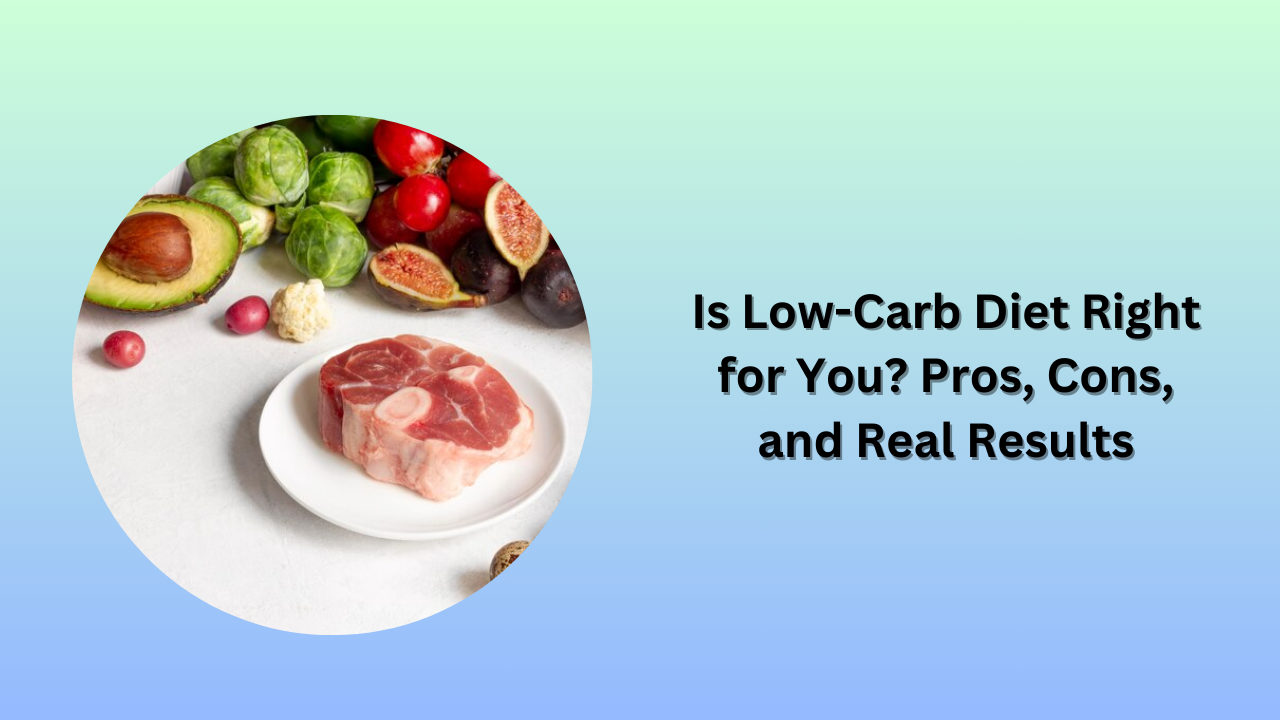The low-carb diet has gained considerable attention over the past few years, with success stories and celebrity endorsements flooding social media and lifestyle blogs. But is this dietary approach suitable for everyone? This article will explore the pros and cons of adopting a low-carb diet, share real-life experiences, and help you determine it’s fit for your lifestyle and health goals.
What is a Low-Carb Diet?
In a low-carb diet, carbohydrate intake is restricted and protein and fat are the focus instead. This shift in macronutrient focus can lead to various metabolic changes in your body.
Key Aspects of Low-Carb Diets:
- Types of Low-Carb Diets: There are several variations, including the ketogenic diet, Atkins diet, and paleo diet. Each has its unique guidelines on carbohydrate intake.
- Carb Restriction Levels: Generally, a low-carb diet limits carbs to about 20-150 grams per day, depending on the specific plan.
- Focus on Whole Foods: These diets often encourage eating whole foods like vegetables, nuts, lean meats, and healthy fats while avoiding sugars and processed carbs.
Pros of a Low-Carb Diet

Adopting a low-carb diet can offer several benefits, though they may vary from person to person.
Potential Benefits
Weight Loss:
- Many individuals find they lose weight quickly on a low-carb diet due to reduced insulin levels, which promotes fat burning.
- Once your body enters a state of ketosis (especially in ketogenic diets), it starts burning fat for fuel.
Improved Blood Sugar Control:
- Low-carb diets may help stabilize blood sugar levels, making them particularly beneficial for individuals with insulin resistance or type 2 diabetes.
Reduced Hunger:
- A diet high in protein and healthy fats can increase satiety, helping you feel full longer and reducing the likelihood of overeating.
Cognitive Benefits:
- Some adherents report improved focus and clarity, particularly when in ketosis. This can be attributed to ketones—an efficient fuel source for the brain.
Cons of a Low-Carb Diet

While there are numerous benefits, it’s also essential to consider some potential downsides associated with a low-carb diet.
Possible Drawbacks
Nutrient Deficiency:
Cutting out many carb-rich foods may lead to a lack of essential nutrients, like fiber, vitamins, and minerals. It’s crucial to choose nutrient-dense foods even within a low-carb framework.
Keto Flu:
For those transitioning to a ketogenic diet, symptoms like fatigue, headaches, irritability, and muscle cramps, often referred to as “keto flu,” are common as the body adapts to burning fat for energy.
Sustainability:
Some find low-carb diets’ restrictive nature hard to maintain in the long term. Social events, family gatherings, and dining out can also pose challenges.
Possible Increase in Cholesterol:
While many see improvements in blood lipid profiles, some individuals may experience elevated cholesterol levels, particularly LDL. Regular check-ups and discussions with a healthcare professional are vital.
Consider Your Lifestyle
When deciding if a low-carb diet is suitable for you, think about your daily routine, food preferences, and long-term health goals.
Real Results: Success Stories and Experiences

Hearing from real people can provide valuable insights into what a low-carb diet looks like in action.
Transformational Stories
- Sarah’s Journey: After struggling with weight for years, Sarah decided to try a low-carb diet. Within six months, she lost 30 pounds and reported significantly improving her energy levels. However, she also noted difficulties during social occasions and had to find creative ways to stick to her diet.
- Mark’s Health Improvement: Mark had been diagnosed with prediabetes. After switching to a low-carb lifestyle, he successfully reduced his blood sugar levels and reversed his diagnosis within a year, all while enjoying a variety of delicious meals.
These stories underline the potential effectiveness of a low-carb diet, but also the importance of aligning the approach with individual lifestyles.
Conclusion
In conclusion, while a low-carb diet can be beneficial for weight loss, blood sugar management, and improved satiety, it’s essential to weigh these benefits against potential downsides. It’s not a one-size-fits-all solution; what works wonders for one person might not be ideal for another.
Key Takeaway: If you’re considering a low-carb diet, take a holistic view of your health and lifestyle. Consult a healthcare professional or a registered dietitian to tailor a nutrition plan best suited for you, ensuring it’s balanced and sustainable.
Ready to transition into a low-carb lifestyle? Start by experimenting with a meal plan and tracking how your body responds. Every journey is unique—embrace yours!
For further reading on low-carb diets, you might find these resources helpful:
Feel free to share your experiences in the comments below or ask questions if you’re pondering a low-carb diet! The first step towards a healthier lifestyle is making informed choices.


